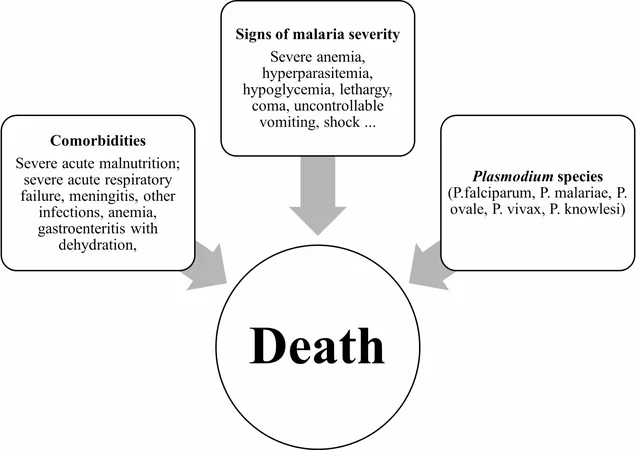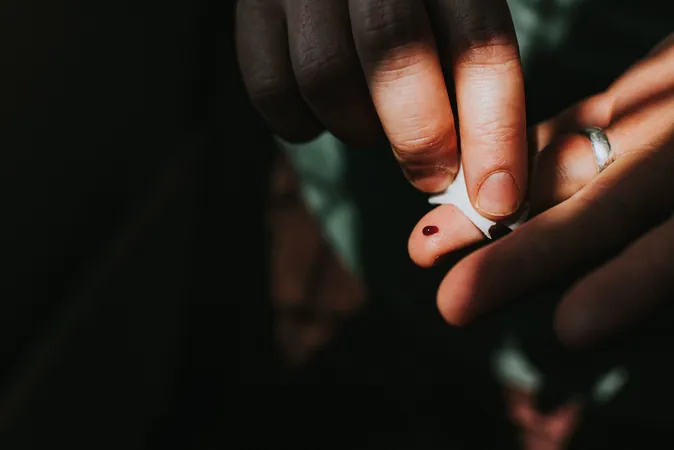
Unmasking Malaria's Mortality: Key Factors That Could Save Lives of Children in Dori, Burkina Faso
2025-04-10
Author: Nur
The African Malaria Crisis: A Focus on Children
Malaria remains a devastating health threat in Africa, accounting for an overwhelming 94% of global cases and 95% of fatalities in 2023. Alarmingly, children under five bear the brunt of this burden, making up over two-thirds of malaria deaths. This article sheds light on a critical study conducted at the Regional Hospital Centre (RHC) in Dori, Burkina Faso, that explores the prognostic factors contributing to the mortality of pediatric malaria patients.
Study Overview: Tackling Malaria Mortality in Children
In a bid to identify the key factors linked to malaria deaths among children aged 1 to 59 months, researchers analyzed a cohort of 444 hospitalized patients between August 1 and September 30, 2022. Using systematic inclusion criteria and advanced Cox regression analysis, the study aimed to uncover actionable insights that could shape interventions and healthcare policies.
Startling Findings: Unveiling Key Risk Factors
The results revealed a grim case fatality rate of 14.4%, with a median time to death of just five days. Critical risk factors identified included respiratory distress, hypoglycemia, shock, altered consciousness, acute gastroenteritis, and high parasite density—each significantly increasing the likelihood of mortality. For instance, patients experiencing respiratory distress were 3.8 times more likely to die, while those in shock faced a staggering 4.1 times greater risk.
Urgent Need for Targeted Interventions
What these findings underscore is the pressing necessity for targeted interventions in resource-limited settings like Burkina Faso. Improved access to critical treatments such as oxygen therapy and blood transfusions is crucial in mitigating the high mortality rates observed in hospitalized children. While substantial progress has been made in malaria prevention and treatment, the alarming trends demand immediate action.
Burkina Faso: A Nation Struggling Against Malaria's Grip
Burkina Faso is one of the countries hardest hit by malaria, where it contributes to 67.2% of hospitalizations and a staggering 23.9% of deaths in health facilities. The continuous rise in microscopy positivity rates highlights the ongoing challenges faced—despite decreasing pediatric prevalence, the Sahel region remains a hotspot for malaria transmission.
The Bigger Picture: Societal Impacts and Inequities
The study also paints a broader picture, indicating that issues like social inequality, malnutrition, and healthcare inaccessibility compound the effects of malaria. The rural, often nomadic populations face hurdles in obtaining timely care, leading to more severe cases and increased mortality.
Recommendations: Shifting Paradigms and Ensuring Access to Care
The study urges policymakers to prioritize investments in health infrastructure, including blood banks and oxygen therapy supplies, particularly in conflict-affected areas. Addressing systemic barriers to healthcare access is essential for reducing the high malarial death toll among children.
Conclusion: A Call to Action for Change
The findings from Dori serve as a wake-up call in the fight against malaria, highlighting the need for rapid recognition and management of severe symptoms in pediatric cases. This research not only contributes unique insights into local determinates of malaria mortality but also reinforces the broader need for enhanced healthcare delivery and resource allocation to save lives.




 Brasil (PT)
Brasil (PT)
 Canada (EN)
Canada (EN)
 Chile (ES)
Chile (ES)
 Česko (CS)
Česko (CS)
 대한민국 (KO)
대한민국 (KO)
 España (ES)
España (ES)
 France (FR)
France (FR)
 Hong Kong (EN)
Hong Kong (EN)
 Italia (IT)
Italia (IT)
 日本 (JA)
日本 (JA)
 Magyarország (HU)
Magyarország (HU)
 Norge (NO)
Norge (NO)
 Polska (PL)
Polska (PL)
 Schweiz (DE)
Schweiz (DE)
 Singapore (EN)
Singapore (EN)
 Sverige (SV)
Sverige (SV)
 Suomi (FI)
Suomi (FI)
 Türkiye (TR)
Türkiye (TR)
 الإمارات العربية المتحدة (AR)
الإمارات العربية المتحدة (AR)